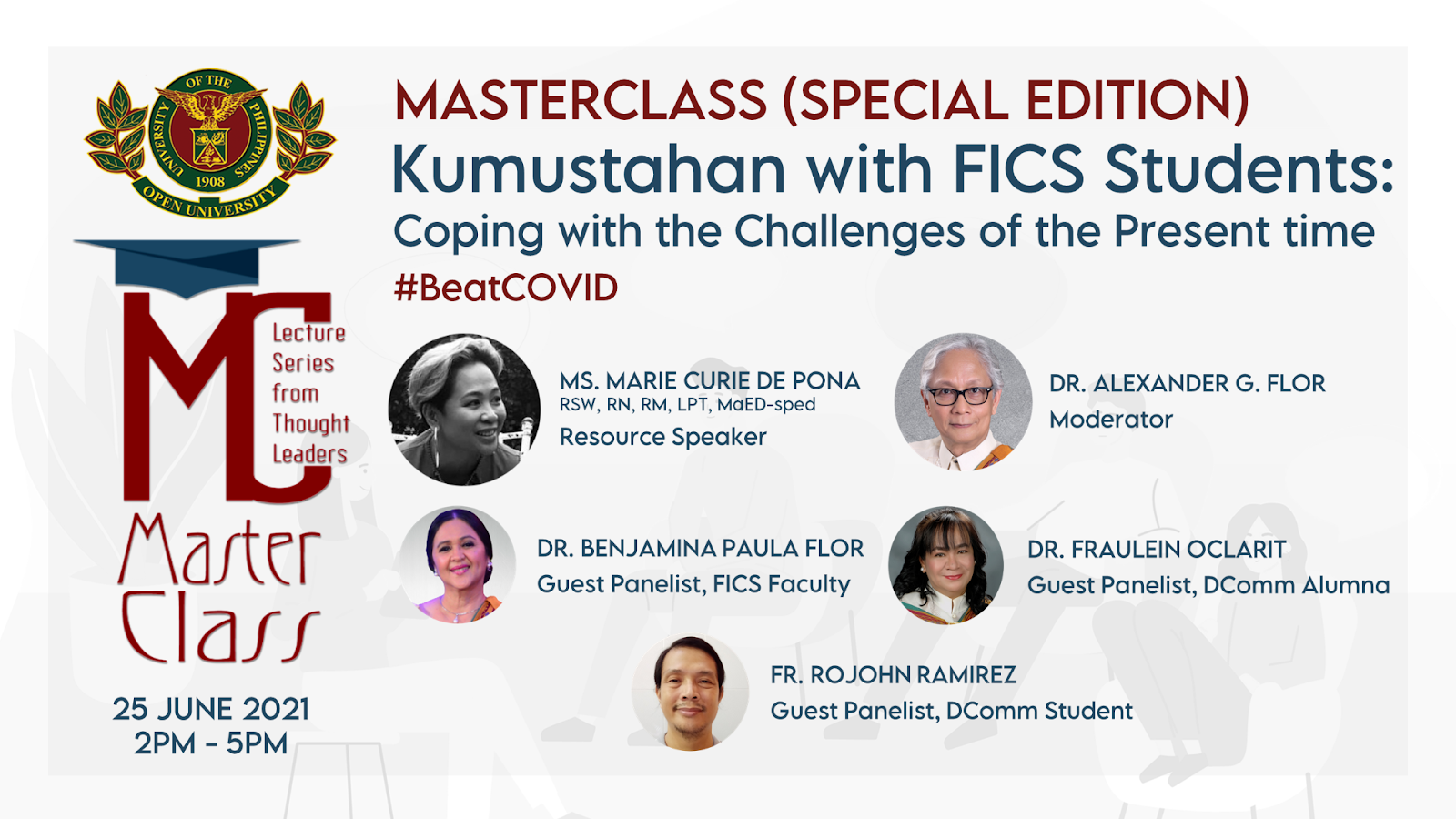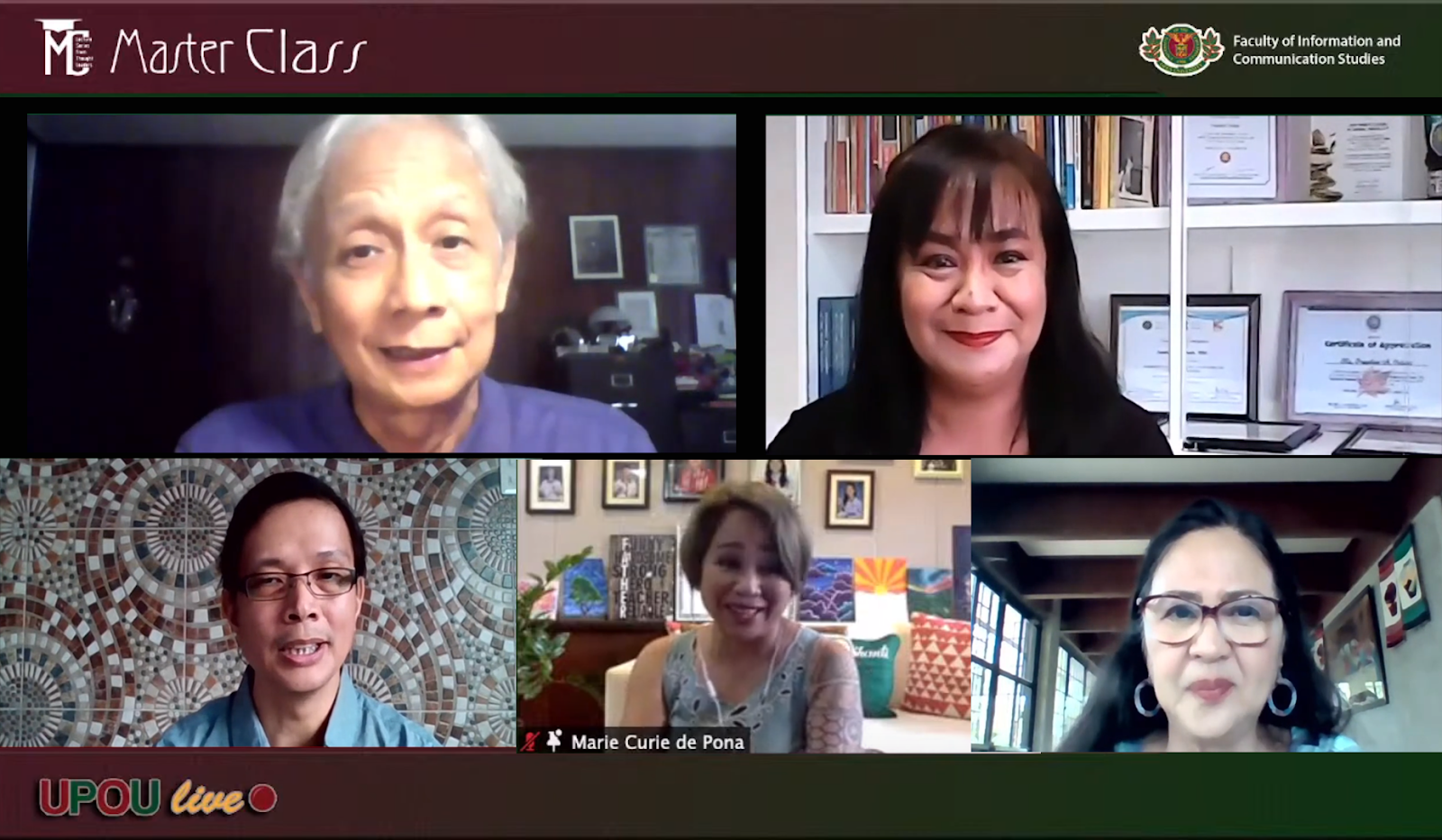
The UP Open University (UPOU) Faculty of Information and Communication Studies (FICS) held a special edition of its Masterclass Lecture Series titled “Kumustahan with FICS Students: Coping with the Challenges of the Present Time #BeatCOVID” on 25 June 2021. Ms. Marie Curie de Pona, a renowned speaker on mental health serves as the Resource Speaker. Guest panelists included Dr. Fraulein Oclarit, a UPOU Doctor of Communication (DComm) alumna; Fr. Rojohn Ramirez, current DComm student; and Dr. Benjamina Paula Flor, Master of Development Communication (MDC) Program Chair.

The Masterclass focused on students’ coping mechanisms during the new normal. It served as a venue for students to share their concerns in the middle of the pandemic.
Mr. Jerry Donato, co-proponent of the Masterclass activity and a current DComm student, gave a brief introduction of the lecture series. Dr. Alexander G. Flor, Dean of FICS, welcomed the participants with the quote from Stephen Denning, the proponent of Knowledge Management for Development, “The best medium for transferring knowledge is through stories.” He also acknowledged the contribution of Dr. Felix Librero, the first Thought Leader of Masterclass, and the other thought leaders who previously offered their wisdom through the past Masterclass sessions.
The sharing of stories and experiences started withDr. Fraulein Oclarit who detailed her experiences as a DComm student trying to complete her dissertation in the midst of a pandemic. When the pandemic started, she recalled, “I had all the time in the world, but I was so distressed. I could not concentrate. I was asking myself, ‘Can I really write my dissertation amidst the pandemic?” She emphasized that she really appreciated the value of conversations, which helped her get through this difficult time. She also encouraged the current students who, like her, were struggling to complete their academic requirements, to engage in conversations and build relationships with those going through the same experiences. She added that the support of her advisory committee and her fellow DComm students mainly helped her to push herself to finish her dissertation. She ended her sharing with the words, “Wala po sanang bitawan. Maaabot din natin ang pinakamimithing sablay. (Let’s not give up. We will soon get that most-coveted sablay)”.
Fr. Rojohn Ramirez shared his struggle while completing his academic requirements. He recalled his hesitations upon enrolling two major difficult subjects which he almost dropped. He was full of doubt, he said, as he temporarily left the program for a few years to deal with his personal problems. But with the words “Kaya mo yan”, he felt the courage to continue his studies. One thing that inspired him was his relationship with his classmates. “There is a feeling of love at a distance,” he stated. With the feeling of hope that there existed a support group who were always by his side, he was able to finish the requirements for the courses he was taking, and he was able to take the next steps in his journey to completing his doctoral program. He ended his talk with the grateful words to the UPOU and DComm community who supported him, “I appreciate much what you have shared with me and how you made me feel loved even from a distance.”
Ms. Marie Curie de Pona’s talk was grounded on her experience with the Shanti Helpline Center. In general, she shared the mental effect of the pandemic to students and the workforce. She began by sharing her observations on the usual problems experienced by students during the pandemic.
During the pandemic, there was an increase in the number of counselees and in-house patients due to depression and anxiety. She then proceeded to discuss the root causes of depression and anxiety among those affected by the pandemic. Among the root causes are: (1) no social interactions/ feelings of isolation; (2) no exposure to sun; (3) no other physical activities; (4) limited freedom; and (5) limited opportunities to achieve. Ms. Marie also emphasized the importance of managing these feelings: (1) lessen expectations from self and students due to the setup of the pandemic; (2) have more physical activities; (3) have more interactions; (4) exposure to sun and nature; (5) make your routine as close as to pre-pandemic as possible; and (6) create an effective milieu & relaxation activities. She also introduced the concept of cognitive restructuring where one should change the view of a situation, instead of changing the situation to what one wants to be.
The last guest panelist, Dr. Benjamina Paula Flor shared three words to capture what had been shared by the other guest panelists: mindset, a switch in attitude, and perspective or “looking at the pandemic glass half full”. She stated that it’s a matter of trying to weigh things and how one would be in the best position to adapt in a particular situation. She also assured the students that the faculty members, especially the advisory committee of each student, are always there to guide the students should they need advice.
The session also allowed the participants to convey their thoughts and questions through an open forum. A few comments from the participants were sharing of their own experiences in which they agreed that the guest panelists’ shared experiences encouraged them to continue despite the struggles.
With a teasing call from the speakers and participants for a part two of this Masterclass session, FICS hoped that the Kumustahan achieved the goal to provide space for the community to share their experiences, to provide listening ears, and to give hope to others that these trying times were only temporary as long as we continue to fight.








